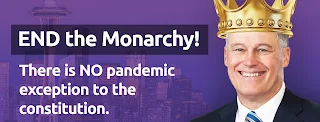On February 29, 2020, COVID-19 Proclamation 20-05 was signed by Governor Jay Inslee, declaring a state of emergency.
Nearly every reasonable person understood the concern over an unknown virus. Few people took any issue with the governor's emergency declaration or even some of the more extreme measures to follow.
When the shelter-in-place order was first issued, it wasn’t enforced but was merely a suggestion, and few people took exception. I thought it was an overreaction but was willing to comply.
Little did we know at the time that this proclamation was the beginning of a long train of abuses that would lead to hundreds of unchecked, unilateral decisions by the governor.
Since Governor Inslee took office in 2013, he has averaged eleven proclamations per year, totaling 77 prior to 2020. Most of the proclamations have been declarations of emergencies; ten were calls for a special legislative session.
Inslee has now made over 320 proclamations without calling for a special legislative session. Making things worse, Inslee disbanded the bipartisan business recovery task force composed of lawmakers and replaced it with Safe Start advisory groups made up of campaign contributors and political allies.
On June 23, 2020, Washington Gov. Jay Inslee ordered the state's Department of Health to create a mandatory mask requirement for citizens.
The following week, King Inslee doubled down by requiring businesses to refuse service to anyone not wearing a mask.
The governor’s poorly thought-out, unilateral action has led to civil unrest. Ironically, in contrast to his intentions, large gatherings became commonplace in protest of the governor's proclamations.
Dozens, if not hundreds, of articles, have been written in recent months about employees, customers, and citizens facing violence over wearing or not wearing a mask.
Obvious but unintended consequences have included unnecessary use of 911 emergency services and verbal and physical assaults against service workers as well as customers.
NPR reported Home Depot would not enforce Washington State’s mask mandate because it was not safe for its employees. (Home Depot later changed their position)
If inciting violence is a criminal act, what do you call the passage of a proclamation directing agencies to require citizens to wear face masks in public and requiring businesses to refuse service to non-masked patrons?
In our highly charged political climate, COVID-19 is both a health concern and a political matter. Depending on who you talk to, some believe this issue is not political but purely related to public health. Meanwhile, others do not find any legitimate justification for considering extreme actions for the benefit of public health and believe it is entirely political.
What happened when Inslee required Washingtonians to wear face masks? Those who believed it a worthy health concern or feared legal or social backlash obeyed, and those who thought it was political hype refused.
Meanwhile, the governor was warning people their safety was at risk because of another person's unwillingness to don a mask, leading to peer pressure, mask shaming, and assaults.
Is this about science or politics? Not since Jim Crow laws and segregation were enforced have we seen government policy so calculated to inspire division and violence.
Many have said that those who do not wear face coverings are selfish and don't care if they kill those around them. People have been labeled murderers for walking in the park without a mask.
When Gov. Inslee uses words like "required" and "mandatory," frames the issue in terms of morality, and selectively enforces the orders, he is guilty of creating an environment of violence and civil unrest.
We must rein in the seemingly unlimited powers the governor believes have been bestowed upon him through the issuance of unilateral dictates and proclamations.
At least one group, Restore Washington, is pushing an initiative for reform to put some limitations on how long a governor is able to legislate without checks and balances.
Initiative 1114 is intended to limit the governor's emergency powers to fourteen days unless extended by the legislature.
It's time to end this madness. It is time to use one last proclamation to call our elected officials into a special session.
We deserve to hear our elected representatives weigh in on the fate of Washington’s businesses and the civil rights and health concerns of its citizens.
Even President Trump—while dealing with a divided Congress—has been able and willing to work with and pass legislation related to COVID-19. Why won’t Washington’s Governor work with our elected officials to govern?
We must have a robust bipartisan debate, expert testimony, committee hearings, public comments, and amendments. And above all else, our legislative body must vote before the governor either signs a bill into law or vetoes it.
Let's follow the outlined and intended process—let's bring our legislators back to Olympia.


Comments
Post a Comment